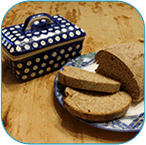"Everything is permissible," but not everything is beneficial...
1 Corinthians 10:23 (CSB)
What do I eat to retrain my appetite?
Choose from a mixture of
While some people may enjoy three large meals a day, others prefer to graze on healthy snacks throughout the day. Listen to your body and experiment to see what keeps you satisfied.
| Potatoes - if baked or boiled and eaten with skin-on |
| All other fresh fruit and vegetables |
| Fruit and veg, frozen or tinned, with only water added |
| Fruit tinned in natural fruit juice |
Pulses:
|
Unprocessed Grains and Cereals:
|
| Rye bread - wholegrain recipe |
| Unsalted nuts |
| Most fresh white fish and frozen white fish (but not battered or in a ready-made sauce etc.) See NHS guidelines for exceptions |
| Tofu |
| Extra virgin olive oil, uncooked, e.g. drizzled on salads |
| Herbs and spices - fresh or dried, without additives |
| Herbal and fruit teas - no added sugar or additives |
| Rooibos/Red Bush tea |
| Oat Drink |
| Water, hot, with or without a slice of lemon |
| Water, cold, with or without ice and lemon |
| Fresh meat - up to three palm sized portions a week, ideally organic |
| Oily fish - See NHS guidelines |
| Tinned fish, including tuna - See NHS guidelines |
| Eggs, up to half dozen a week, ideally free-range and organic |
Dairy products - choose organic whenever possible:
|
| Pure sunflower margarine with no preservatives, emulsifiers, etc. |
| Wholemeal flour - but please note that not everyone finds wheat the most helpful grain. You might want to experiment with other flours such as spelt and buckwheat |
| Wholemeal bread - homemade or bakery (made without emulsifiers) - up to 4 slices daily |
| Wholemeal pasta, max 125g portion size (aim for a 50-75g portion) |
| Basmati or wild rice, max 125g portion size (aim for a 50-75g portion) |
| Homemade, wholemeal, Yorkshire puddings |
| Homemade, wholemeal, scones (made without sugar) |
| Jams made without refined sugars (e.g. "St Dalfour") |
| Olive oil may be used in small amounts for cooking - See BBC News article |
| Tamari Sauce, ideally organic |
| Marmite |
| Mayonnaise, up to one dessertspoonful per day |
| Honey*, up to two teaspoons (10g) daily |
| Pure maple syrup*, up to two tablespoons. Make sure you check the label, and avoid maple syrup that contains any other ingredient than actual maple tree syrup |
Dried fruit, up to a tablespoon (approx. 14g) each type daily, e.g.:
|
| Salted nuts, max small handful |
| Chocolate - minimum 70% cocoa |
| Tea (no sugar) - up to 6 cups daily (this is if no coffee is being drunk - if it is please adjust amount of tea down accordingly as coffee has roughly twice the amount of caffeine as tea) |
| Coffee (no sugar) - up to 3 cups daily (but note that as most Lattes contain two shots of expresso, one of these counts as two cups of coffee!) |
| Fruit juice - up to 200ml daily |
| Alcohol* - max two units a day |
| Refined sugar, including brown and demerara as well as white! |
| Foods made with white flour - including white bread |
| Soft drinks (ideally also exclude diet drinks) |
| Fruit squashes (ideally also exclude 'no added sugar' versions) |
| Foods containing flavour enhancers, such as MSG - these will make you want to keep eating!! |
| Foods containing artificial flavours, colours and preservatives etc. |
| Margarines containing emulsifiers |
| Bread made with emulsifiers - unfortunately this includes most prepacked loaves |
| Processed meat - including sausages, bacon and most prepacked cooked meats, which contain preservatives - there has been shown to be a link between these foods and cancer - See BBC News article |
| Chocolate that contains less than 70% cocoa. Chocolate in itself is not bad; in fact it is a source of various nutrients, including iron. Unfortunately, most of the chocolate we eat actually contains rather more fat and sugar than chocolate. This turns chocolate into sweeties! Therefore, if you eat it more often than as a very occasional treat, choose chocolate which has a minimum of 70% Cocoa Solids; this will be shown on the wrapper and can be included as an amber food |
| Adding salt to food. However if you really cook EVERYTHING from scratch, with no processed foods or any bread at all, then you may want to add a little salt to your cooking (NHS guidelines currently suggest a maximum daily intake for adults should be 6g) |

